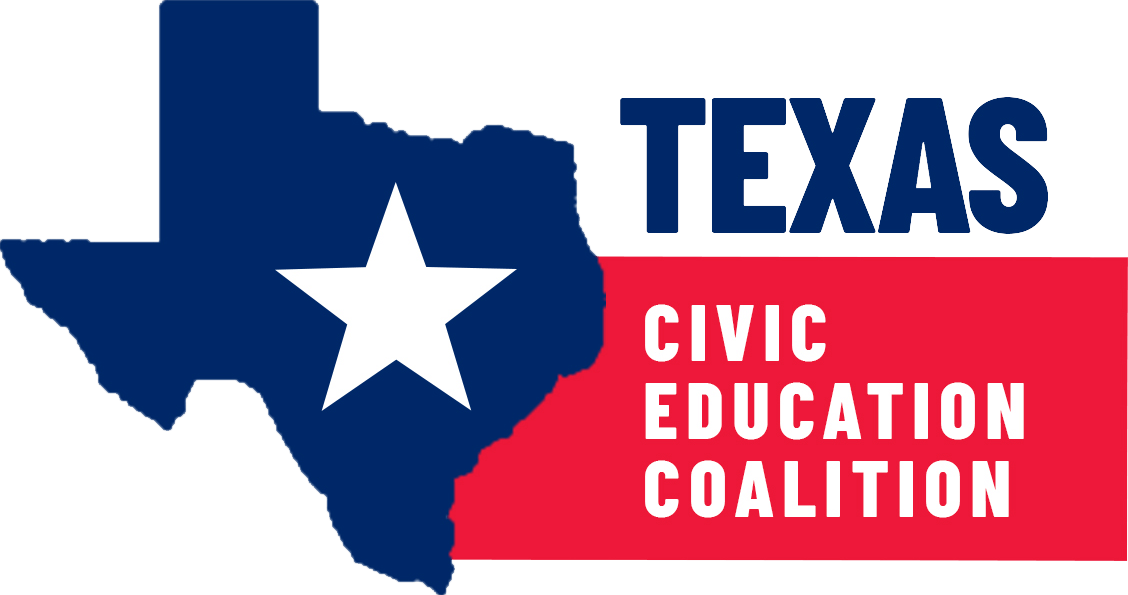Texas Civic Education Coalition’s Mission

November 20, 2019 was an eventful day for civic education in Texas. For the first time key stakeholders assembled and agreed to work in concert to advance comprehensive strategy for civic education reform in Texas. Over a decade of research, surveys and anecdotal information indicates comprehensive civic education that includes all four pillars (civic knowledge, skills, dispositions and behaviors) is the foundation necessary for long term, informed civic engagement (see references below). While there is some strength in the civic knowledge and civic skills currently prescribed in Texas, there is a lack of focus on civic dispositions and behaviors.
The Texas Civic Education Coalition’s mission in conjunction with the CivXNow National Coalition is to prepare our youth for responsible, informed and active participation in civic life by promoting education initiatives that support the key pillars of a comprehensive civic education. The Texas Civic Education Coalition will pursue its mission through consensus built, research-based, educator-approved, non-partisan legislation, standards enhancements, and non-legislative school programming opportunities.
Key Research includes:
- CIRCLE Working Paper 52: Civic Engagement and High School Academic Progress
- Guardian of Democracy: The Civic Mission of Schools
- The Republic is (Still) at Risk—and Civics is Part of the Solution
- Paths to 21st Century Competencies Through Civic Education Classrooms
- The School’s Role in Developing Civic Engagement
Key Themes of the Initial Coalition Meeting Discussion
1. Now is the time.
- Alarming statistics regarding the state of our Republic were shared at the meeting and include: 35% percent of Millennials said they were losing faith in American democracy, and
just 25% were confident in the democratic system; 43% of voters nationwide at least somewhat agreed “the Constitution made sense in the 18th century, but it is irrelevant in the 21st century”; 24% of U.S. millennials considered democracy to be a ‘bad’ or ‘very bad’ way of running the country”; when asked about the importance of democracy to American society, only 39% of young adults ages 29 and under said it was “absolutely important”; 24% of the public in a 2017 survey said rule by “a strong leader who does not have to bother with Congress and elections” is a “very good” or “fairly good” way to run a country; 18% said the same about “army rule.” - PDK released its 51st annual poll of the public’s attitudes toward public schools. The results clearly supported high quality civic education in our schools! 97% of poll respondents said civics should be taught, 75% to 97% of all adults say public school classes should teach values and cover honesty, civility, respect for authority, and acceptance of people of different religions.
- The Texas Legislature demonstrated last session it is attentive to the need for improved civic education. It is imperative we inform legislators of our collective knowledge regarding best practices for effective civil education and provide them a comprehensive plan rather than a band-aid or partial solution.
2. Building a strong coalition for maximum impact
Need for diverse representation from stakeholders: K-12 education, higher education, law, policy, business, public sector and private sector. Critical need for teacher and student voice. Bipartisan representation working together toward non-partisan solutions.
3. Legislative and non-legislative solutions
- Legislation should ensure current civics strands are protected and additional enhancements mandated that focus K-12 instruction on civic skills, dispositions and behaviors in addition to civic facts.
- Legislation should encourage teacher and administrator training to navigate the challenges created in this intensely polarized time, to learn effective use of modern civic resources, and to understand the benefits of whole school programming.
- Legislation should not be proscriptive and should not require specific curriculum or favor a particular vendor.
- We have already met with the Governor’s and Lieutenant Governor’s offices and will continue to work with them on our legislative efforts. Our legislative strategy task force will identify early potential supporters in the House and Senate to begin preparatory pre-session meetings.
- Non-legislative programming will be pursued in Texas to promote a whole school civics ethos and to recognize both school achievement in civic readiness as well as individual student excellence in this area. We have met with the Commissioner of Education and obtained his commitment to work with us on appropriate programming options. The Commissioner also provided very useful insight on the piloting and data analytics necessary to demonstrate efficacy, equality and consistency in programming across the state. School reform efforts have focused on improving basic literacy for decades; however, civic education reform can also improve school effectiveness. Watch the story of what happens when a school infuses civics across the curriculum – in and out of school- and nurtures relationships of respect and trust between teachers, students, and the community. Less than a decade ago, Washington High was very much a school in trouble, struggling as an Illinois Priority School because it had ranked in the bottom 5% for achievement in the state for three years or more. Since then, the school has seen a complete turnaround. It is now a Level 1 school, the highest ranking that Chicago Public Schools awards. Academic achievement is up, discipline incidents are down, and the school is a place where students thrive and feel a sense of belonging and pride.
- Infusion into ELA: There is a ripe opportunity to infuse civics into ELA instruction, especially at the elementary level.
- Correlating history and civics: We understand the limited classroom time available. We also recognize many of the necessary civics’ disciplines can be effectively infused simultaneously as part of the currently required history content. The National Endowment for the Humanities (NEH) and the U.S. Department of Education just awarded a grant to Educating for American Democracy: A Roadmap for Excellence in History and Civics Education for All Learners. The project will coalesce a team of more than 100 leading academics and practitioners in education, civics, history, and political science to set out a foundation for understanding and teaching American history and civics. The project will culminate in 2020 with the issuing of a Roadmap that will outline high-priority civics content areas and make clear and actionable recommendations for integrating the teaching of civics and history at every grade band, along with best practices and implementation strategies that teachers, schools, districts and states can use to shape their instructional programs. CivXNow newsletter
- TEKS: As the 2023 scheduled TEKS revisions begin, we will look to meaningfully strengthen and enhance those standards consistent with the legislation requirements without simply adding more tasks for teachers. We will work with the TEA and State Board of Education on appropriate TEKS enhancements that will allow more effective civic skill, disposition, and experiential learning opportunities while preserving existing essential civic knowledge strands.
Watch the CivXNow documentary to see how Chicago’s George Washington High School used civics to drive change:
4. Funding:
The Coalition is actively raising funding for robust teacher and administrator level professional development. To provide time, training, and resource solutions for the difficulties teachers and principals face navigating this highly polarized environment as they work to teach students how and why to be responsible, knowledgeable
contributors to our democratic republic.
Private funding for professional development is absolutely necessary to supplement any requested public funding.
We are excited to announce that we have already secured commitment from the American Board of Trial Advocates to design an administrator level professional development program to demonstrate (1) the importance of supporting strong civic education programming as the foundational mission of our schools, (2) how a strong civic education correlates improved school effectiveness as well as college and career readiness, and (3) best practices for a whole school civics ethos.
Next Steps
- Many coalition members volunteered to serve on currently needed work groups, such as: Legislative Strategy, Civics Curricular K-12 Content, Individual Student Civics Diploma Seal Program, School and District Achievement in Civic Readiness and Coalition Internal Communications and Outreach. Additional work groups will no doubt be added as we progress, so there will be opportunities for all to get involved. The task force chairs will coordinate with committee members to organize initial phone meetings and work streams and we will highlight those work streams in the next newsletter.
- Our Coalition collaboration involves education stakeholders including Texas Council for the Social Studies, Texas Social Studies Supervisors Association, Texas Association of School Administrators, Texas Association of Student Councils, Texas Association of Secondary School Principals, the TEA, the State Board of Education, numerous individual teachers and administrators, and collegiate systems such as TWU, Baylor, TCU and UT; civic and education policymakers and supporters including the Annette Strauss Institute, Texas Public Policy Foundation, Center for Public Policy Priorities, Children’s Defense Fund, Texas Association of Counties, League of Women Voters, Humanities Texas, the National Archives, the presidential libraries, various chambers of commerce, Educate Texas, The Sumners Foundation and ABOTA; and civic education providers including iCivics, YMCA Youth and Government, Generation Citizen, American Heritage Education Foundation and Lead4ward, among others. Please continue to submit your thoughts on additional organizations we should include in our discussions and efforts.
- We will participate in the upcoming January Texas LRE conference and the ABOTA conference to present the Coalition goals and rally support. Please continue to submit information on future conferences we should include.
- Finally, we are continuing to meet with private sector funders regarding investment in this unique opportunity for collaborative, state-wide, large-scale civic education reform in Texas. Please communicate any additional ideas for potential funding opportunities.
- Currently, all Coalition communications can be sent to Texas@iCivics.org. As our Communications task force assembles, additional communication platforms and social media opportunities will be explored. We will keep you apprised of these ongoing developments.
I look forward to working together on this critical effort in Texas!
Sincerely,
Wendy May-Dreyer
Texas Civic Education Coalition Board Chair, iCivics

